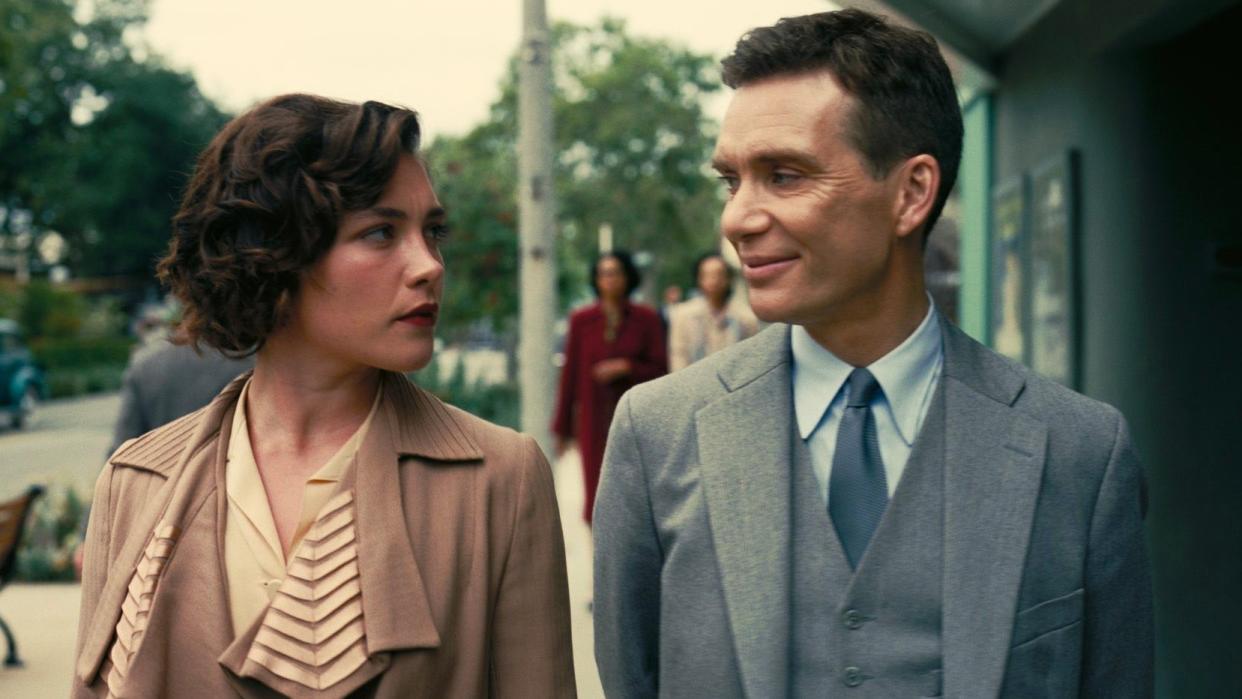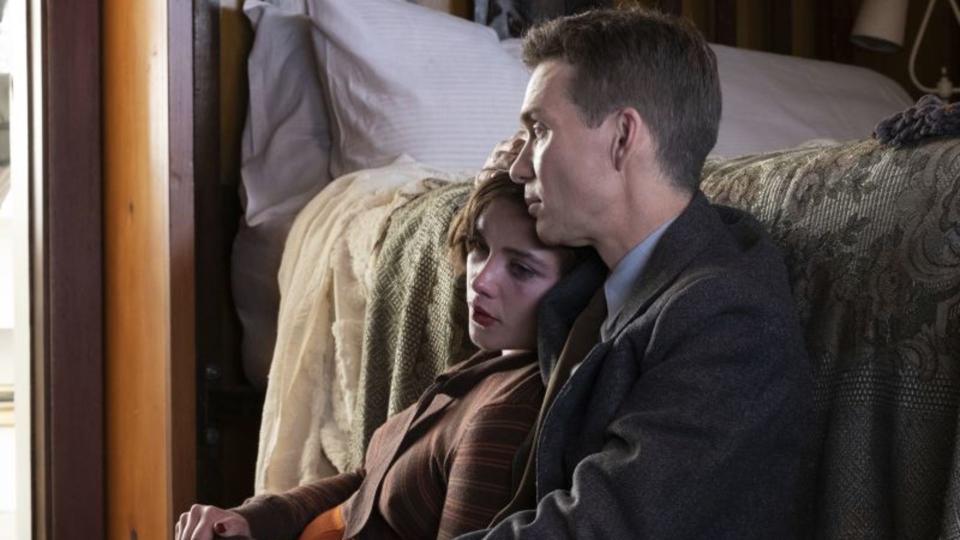‘Oppenheimer’ Sex Scenes Aren’t Worth the Hype (Opinion)

- Oops!Something went wrong.Please try again later.
- Oops!Something went wrong.Please try again later.
[Editor’s Note: The following story contains spoilers for “Oppenheimer.”]
“Oppenheimer” hinges on the haunting feeling that man-made death is lurking nearby, and yet, the film bungles the “little death” that has been highly anticipated along its press tour.
More from IndieWire
With 'The Flash' Leading VOD, Warner Bros. Discovery Gets Another #1 Film
Christopher Nolan Movies, Ranked from 'The Dark Knight' and 'Tenet' to 'Dunkirk' and 'Oppenheimer'
Writer-director Christopher Nolan said that “Oppenheimer” is his first film across his 25-year career to show sex and sexualized nudity onscreen. “Oppenheimer” landed Nolan’s first R-rating since 2002’s “Insomnia” due to the included nudity. The official Motion Pictures Association rating description lists “some sexuality, nudity and language, with brief scenes of strong sex which include breast and buttock nudity.” Of course, this inevitably led to viral FilmTok and Film Twitter posts anticipating just how “strong” the hyped sultry sequences would be.
The first (very, very brief) scene in question features Florence Pugh and Cillian Murphy having robotic intercourse after Pugh arches her eyebrow and engages in witty banter at a Communist Party mixer. Pugh portrays psychiatrist Jean Tatlock, with Murphy starring as the eponymous father of the atomic bomb, J. Robert Oppenheimer. Nolan told Wired the two characters’ love story “is as strong as I’ve ever done” across his films, most of which recently have starred longtime collaborator Murphy.
Lead actor Murphy detailed his chemistry read with Pugh for The Guardian, saying, “They put two actors in a room to see if there’s any spark, and have all the producers and director at a table watching. I don’t know what metric they use, and it seems so outrageously silly, but sometimes you get a chemistry and nobody knows why.”
The Guardian cited “prolonged nudity” that made for a “significant shift” in Nolan’s career. Murphy echoed that the complicated sex scene involving Blunt’s Kitty imagining Oppenheimer and Tatlock was “pretty heavy.”
Well, what wasn’t heavy was the chemistry which proved to also be elusive onscreen, just as the “strong sex” was weakly deflated and impotent.

Tatlock and Oppenheimer’s affair spanned years and overlapped with Oppenheimer leading the Manhattan Project, concluding with Tatlock’s suicide at age 29. Their romance affected Oppenheimer’s marriage to Kitty (Emily Blunt) and later was used as an example of his Communist Party sympathies during a career-ending investigation. So, shouldn’t Tatlock and Oppenheimer’s twisted love story be portrayed with the same fiery passion as its real-life history? Nolan’s depiction of the Trinity Test is infinitely more explosive. “Oppenheimer” used actual scientists as extras, but clearly there was no expert on chemistry on set due to the sexless sex scene and awkwardly cold encounter.
Pugh and Murphy appear nude in three scenes, starting with the aforementioned and very brief intercourse sequence, during which Tatlock (Pugh) interrupts their lovemaking to ask Oppenheimer (Murphy) to read the “Bhagavad-Gita” in Sanskrit (namely the line, “Now I become Death, the destroyer of worlds”) as she holds the book over her bare breasts. As IndieWire critic David Ehrlich wrote in his review, “we’ve all done it” with a Sanskrit reference to get it on in the bedroom.
Tatlock and Oppenheimer later sit opposite one another completely nude, with their genitalia covered with well-placed armchairs and camera angles, as Oppenheimer essentially breaks off their affair. The final and most memorable scene has Oppenheimer recalling his romance with Tatlock while his wife Kitty (Blunt) looks on; Murphy appears naked, vulnerable in his honesty, with Tatlock soon draped across him, slowly gyrating while making eye contact with Kitty as Kitty begins to cry.

The real transcript from the United States Atomic Energy Commission In The Matter Of J.Robert Oppenheimer hearing in 1954, which is portrayed in the film, has Oppenheimer comparing his affair with Tatlock, saying at the time on record, “We were at least twice close enough to marriage to think of ourselves as engaged.”
However, Nolan strays from having Tatlock engaged in too many scenes other than her slowly writhing like a flapping fish in Oppenheimer’s lap.
As IndieWire’s Ehrlich added of Nolan’s signature fumbling of female characters, “Tatlock is played by a flushed-cheeked Florence Pugh, whose ‘be here now’ earthiness adds a necessary edge to one of the Mal-est female characters Nolan’s written in a minute. Emily Blunt has no such luck in the role of Oppenheimer’s alcoholic wife, whose diminishment feels particularly egregious in a movie that hardly bothers to express what Oppenheimer thinks of her, or if he thinks of her at all.”
Nolan admitted to The Telegraph UK that he found the sex scenes initially “frightening and challenging — but it was the appropriate challenge for the story.”
Nolan continued, “I try not to be self-conscious about why something is going into a film, just as I try not to think, ‘What haven’t I done before?'”
He similarly said to The Los Angeles Times that “Oppenheimer” is his most “extreme” film to date in part due to the uncharted territory of eroticism. “I worried, ‘Can I even get into that?'” Nolan said of Oppenheimer and Tatlock’s affair. “It’s so complicated, so important, the backbone of who he is, but it doesn’t fit into any neat dramatic relationship. But things that don’t fit can take on idiosyncratic relationships of their own, they can spike out and become important.”
The “Oppenheimer” sex scenes come on the heels of controversial female full-frontal nudity in recent premieres like “No Hard Feelings,” “The Idol,” and “And Just Like That” Season 2. Actress Pugh has previously stripped down for past roles and has been vocal about the importance of sex onscreen, while also being unashamedly topless on the red carpet.

With certain actors requesting less sex scenes and nudity onscreen, the debate over the merits of sex in cinema has only deepened. Of course, “Oppenheimer” isn’t the only recent biopic to feature sex with historical 20th century figures. Andrew Dominik’s “Blonde” landed an NC-17 rating in part due to a scene involving John F. Kennedy (Caspar Phillipson) watching the destruction of an atomic bomb on TV while receiving a blow job from Marilyn Monroe (Ana de Armas).
“Oppenheimer” star Murphy told The Sydney Herald that the sex scenes in question were “written deliberately,” adding of Nolan, “He knew that those scenes would get the movie the rating that it got. And I think when you see it, it’s so fucking powerful. And they’re not gratuitous. They’re perfect. And Florence is just amazing.”
As for Tatlock’s legacy as portrayed by Pugh, “Oppenheimer” only alludes to her suicide at age 29. Tatlock drowned herself in her bathtub in San Francisco; Nolan opted to only show the pillows Tatlock was found kneeling on and a sink filled with water and hair clippings. To note, this is Tatlock’s second onscreen portrayal: Natasha Richardson played the late scientist in 1989’s “Fat Man and Little Boy.”
To Nolan, Tatlock was integral to showcasing the effect Oppenheimer had on women, and that as a filmmaker, he was “appropriately nervous and appropriately careful and planned and prepared” when it came to intimacy coordination.

“Well, when you look at Oppenheimer’s life and you look at his story, that aspect of his life, the aspect of his sexuality, his way with women, the charm that he exuded, it’s an essential part of his story,” Nolan told Insider. “His very intense relationship with Jean Tatlock, played by Florence Pugh, is one of the most important things in his life. But not least for the fact that Jean Tatlock was very explicitly a Communist and his obsession with her therefore had enormous ramifications for his later life and his ultimate fate.”
Nolan continued, “So it felt very important to understand their relationship and to really see inside it and understand what made it tick without being coy or allusive about it, but to try to be intimate, to try and be in there with him and fully understand the relationship that was so important to him.”
So why then does sex feel like an afterthought in “Oppenheimer”? Out of all the explosions onscreen and discussions of the physical attraction of atoms, there lacks a spark in Nolan’s approach to sensuality and emotions outside of Oppenheimer’s intellectualism.
Best of IndieWire
Sign up for Indiewire's Newsletter. For the latest news, follow us on Facebook, Twitter, and Instagram.

